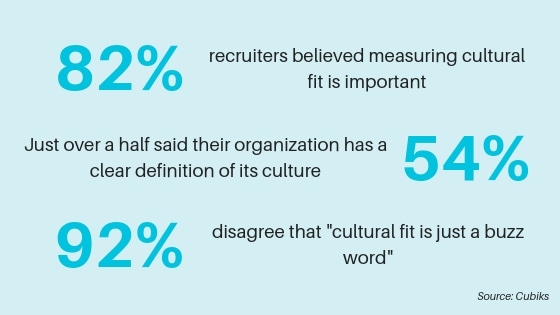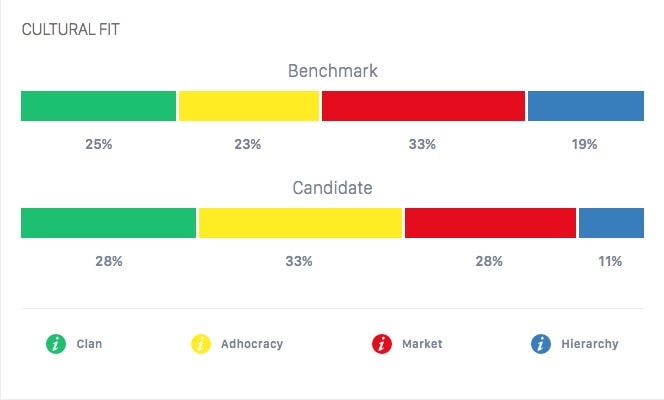
5 ways to assess cultural fit in your tech candidates

When you’re hiring for tech roles, you need people to be job fit, meaning that they are actually capable of doing the job you’re hiring for. For example, you need to be sure that your tech candidates know certain programming languages, can navigate certain software, etc. Nevertheless, these specific skill sets shouldn’t be the only competencies you evaluate your tech candidates for. According to Forbes, 89% of hiring fails are a result of poor cultural fit. Which means you need to ensure that the potential tech candidate and your company are aligned in both core values and ways of working. While job fit is one thing, cultural fit is an entirely different kettle of fish. And arguably one that is just as important.
Neither should take precedence over the other, in fact, in a perfect world, your ideal tech candidate should have both. And even though the US Bureau of Labor Statistics predicts a deficit of over one million tech employees come 2020, that doesn’t mean you should be rushing to hire the first person who comes along with the requisite job skills, even though they won’t mesh well with your company. Because the cost of a bad hire is much higher than you think, especially when it comes to developers.
So, while you can verify each candidate’s technical skills via assignments, coding challengesそして technical interviews, how do you assess something much less tangible and far more subjective, such as cultural fit?
What is cultural fit and why it’s important
Cultural fit is a difficult concept to succinctly define. However, if it’s lacking, it’s blatantly obvious to all involved.
In its most fundamental form, cultural fit is where an employee’s beliefs, values, and behaviors parallel, or closely align to, their employer’s beliefs, values, and behaviors.
Cultural fit can be as simple as offering outstanding career development training when hiring ambitious employees. Or it can be as misaligned as designing an open plan office that places a real emphasis on collaboration and teamwork, then hiring a group of people who prefer working individually.
Hiring employees who want the company to succeed is vital to success. Enthused employees perform better, they stick around for longer and have greater job satisfaction. You’ll get the bare minimum out of an employee who turns up solely to collect their paycheck at the end of the month. An employee who doesn’t fit the culture can quickly become a rotten apple, spoiling the whole barrel, wreaking havoc within the rest of the team and beyond.
There is one important point to note with the cultural fit – hiring for cultural fit does not mean hiring the same type of people repeatedly. In fact, hiring people who are a cultural fit should translate into a workforce whose members contribute to the company in diverse ways. Diversity is vital for both employee and company growth.
 Whilst 82% of recruiters believe that measuring cultural fit is important, only 32% actually do so. And yet, most hires fail because of attitudinal reasons and poor cultural fit, not a lack of technical skills. Which is why cultural fit is crucial for:
Whilst 82% of recruiters believe that measuring cultural fit is important, only 32% actually do so. And yet, most hires fail because of attitudinal reasons and poor cultural fit, not a lack of technical skills. Which is why cultural fit is crucial for:
- Improving Quality of Hire. Hiring employees who match the company culture instantly increases the value they add to the company, better enabling its long term success.
- Reducing and preventing employee turnover. Employees who are satisfied in their work, who believe in what they’re doing and feel connected to their place of work stick around. Employees who don’t play well with the team will churn, or become toxic.
- Increasing employee satisfaction and engagement. Employees whose values align with the company’s are more committed to their work and will go above and beyond to achieve great results.
- Boosting productivity. Happy, engaged, and productive teams who live and breath the company’s core values, produce better results.
So that’s great and all, but what can you actually do to assess potential tech candidates’ cultural fit?
5 ways to assess cultural fit in your tech candidates
1. Use an assessment
Make a cultural fit assessment a part of your selection process and make it clear why you want the candidate to answer these questions. You want to ensure that your company would be the right place to work for them.
You have to know exactly what the culture at your company is like, for example, by knowing where you stand in the Competing Values Framework. Then, you’re able to compare the candidate’s preference for company culture to the actual culture at your organization.
 A company sets its company culture benchmarks according to the Competing Values Framework and compares the candidates’ preferences through a cultural fit assessment.
A company sets its company culture benchmarks according to the Competing Values Framework and compares the candidates’ preferences through a cultural fit assessment.
If it’s abundantly clear that the two of you don’t fit, there is no need to take the application any further. You won’t change the candidate’s personality and you can’t afford to waste time and wait till they ‘adapt’ to your culture. This is especially true as there is no guarantee that they will. Instead, only take those candidates who will fit in easily and seamlessly with your company culture forward to the next stage.
2. Ask the right interview questions
As the person responsible for your company’s hiring of tech candidates, you will be familiar with the usual questions required to assess job fit. But by asking the right cultural fit questions, you can learn a lot more about the candidate and their mutual compatibility with your company, by learning about how they worked in previous companies. You also get an insight into their work ethic, values, and priorities.
To get a deeper understanding of the candidates, ask each one about their work history, how they have ended up where they are, what their career journey has been like, what they’ve enjoyed or haven’t enjoyed, where they hope to go next, and what their future career aspirations look like. You’ll get a much more rounded picture of a person by adding cultural fit questions to your assessment of technical skills.
Cultural fit questions look at:
- Whether the potential tech candidate will get on with your existing team members.
- Whether they will interact with your customers well.
- How responsive they’ll be to your company’s way of working.
- Whether they’re likely to hang around for the long haul, or whether they’ll cut and run at the first opportunity that presents itself.
- Whether they share your values and will further the company’s growth.
Examples of cultural fit interview questions:
- Describe the work environment in which you flourish.
- What management style brings out the best in you?
- What are your thoughts on becoming friends with co-workers?
- What is your preferred work style?
- Describe your ideal workday.
- When you work in a team, what is your go-to role?
3. Be prepared to answer questions
Interviewing is a two-way process so you have to be prepared for questions from tech candidates about the company culture, mission, vision, and values. While you don’t want to hire the wrong candidate, candidates also don’t want to work for a company whose culture they know they won’t fit in with. So make sure you know what your company stands for.
You can’t expect to hire candidates who fit your company culture if you yourself don’t know what it is.
If you don’t have one already, write down the company mission statement and its core values. Make sure you keep them with you. Slack, for example, values empathy, solidarity, craftsmanship, and playfulness above technical skills when they’re recruiting.
They also value tech candidates who have done their homework and who come for an interview with a list of questions to ask about the company. And you should too. Because you want tech candidates whose interests lie beyond their cubicle walls. You’ll grow more with people who are genuinely interested in the company and in contributing towards its growth, not just in collecting a paycheck each month.
Expect to field questions about why the role has opened up, where the previous incumbent has gone and why, and how your company rewards success. Also, expect to discuss anything that is on your social media profiles.
4. Let the candidates meet the team
Consider adding a peer interview to your recruitment process. Letting the candidates and team members interact with each other will allow both sides to learn about one another and how they would work together.
Consider adding peer interview into your selection process, as it is one of the most efficient ways to assess cultural fit.
Moreover, your tech candidates can ask their potential fellow colleagues questions they might be reluctant to ask you, especially if those people would be the same grade as them, or who have the same skill sets as them.
5. Offer insights into your company
Let potential tech candidates have a behind the scenes look at your company via online videos of the company, including interviews with various personalities who work there, or with realistic job previews.
- Post these videos on your career site, your social media or include them as a part of your tech candidate selection process.
- You can also invite candidates to an informal event at your company, a meet and greet or a social mixer, for example.
- Offer candidates the opportunity to shadow a member of the team they might join for a few hours. Or even have them do a trial work period for a short time at pre-agreed conditions.
You will get to see the tech candidates in a variety of different lights, not just in interview mode, but if candidates don’t like what they see, they will deselect themselves from the recruitment process.
A final word
Hiring tech employees is hard and good candidates are scarce. That’s why you can’t afford to make mistakes such as hiring candidates based solely on their technical aptitude. Instead, assessing both job fit and cultural fit will help you make sure that you’re hiring the right person who will become a happy and productive employee at your company.
Author’s bio
Alexandra Johnson is a seasoned writer specializing in HR, recruitment and tech topics, and an author at Harver. When she isn’t at her desk writing, she’s researching tech developments.
画像出典 Brooke Cagle オン アンスプラッシュ




